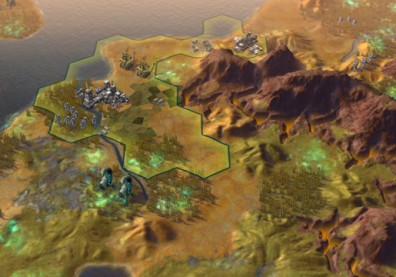In Civilization V, the only useful improvements you could put down on a flat, empty tile of land was a farm or, later, a trading post. Not too many options to decide among. In Beyond Earth, however, you have many different improvements to put down on any given plot of land, so here's a quick rundown of the different options you can consider when telling your worker units what to do.
More Civ Tips: Get Unreal Yields Out Of Your Ocean Tiles In Beyond Earth
Note that this will only cover standard improvements, not resource improvements. If you have a resource near your city, you're obviously going to want to improve it at some point once you have the technology to do so. This guide is for deciding what to put on those empty tiles around your cities.
Right off the bat at the start of the game, you'll have access to three improvements: mines, farms and generators. Mines give you a maintenance-free production boost, but they can only be placed on hills. Unless you're absolutely surrounded by hills, any hill in your area should probably be earmarked for a mine. They're easy ways to get solid production numbers without draining your other resources. The real decision is whether to start putting up farms or generators on your flat land. Farms give you a low food bonus, but investing in the right tech can make farms very powerful by the end of the game. On the other hand, generators provide you with a solid early-game source of energy, but they become less useful as the game goes on and trade routes become stronger.
More Civ Tips: Learn The Ins And Outs Of The Reworked Diplomacy System
If you're looking to grow your civ quickly, it's a good idea to aim early for the mid-game tech Bionics. This tech unlocks the biowell improvement, a stronger source of food than the farm and a generator of Health as well. Along the way to Bionics, though, is the Robotics tech. This unlocks the manufactory, a very strong source of production that can be made even stronger by the Industry Virtue tree. The manufactory will make your civ's Health drop fast, though, so a combination of biowells and manufactories will help you increase growth and production while mitigating the hit to your Health.
Science-minded players will want to try to get quickly to the Cognition mid-game tech, which unlocks the academy. Academies produce a healthy amount of science, made even more powerful by the Knowledge Vitrue tree.
Finally, one of the most impressive improvements in the game is the terrascape, unlocked with the Terraforming tech. Each terrascape produces +2 Health, production and culture, and it gets 50 percent stronger with a Virtue in the Prosperity tree. The downside to this improvement is that each tile costs six energy per turn. But if you find yourself sitting on a fat stack of wealth, feel free to indulge in some terrascaping fun and start rolling in the yields.
There are a couple of other improvements that provide situational advantages. Players who heavily invest in the new Orbital Layer (I'm looking at you, Soviet Federation) can put up an array for a small science boost and an increase in orbital coverage. Putting up nodes is useful when you're constantly being invaded. These will get you a similar yield to generators and heal friendly units every turn. Finally, the dome improvement is useful for bringing in some extra culture, but there are plenty of buildings that accomplish the same thing without taking up real estate. It might prove useful for a culture-focused civ like Franco-Iberia, however.
Sid Meier's Civilization: Beyond Earth is now available for PC. Mac and Linux versions are coming sometime this year.









